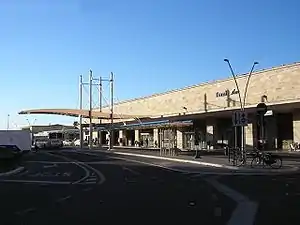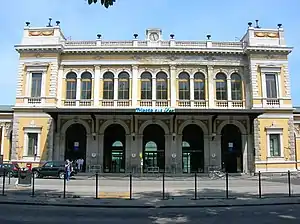Terni railway station
Terni railway station (Italian: Stazione di Terni) serves the town and comune of Terni, in the region of Umbria, central Italy. Opened in 1866, it forms part of the Ancona–Orte railway, and is also a junction station for two secondary lines, the Terni–Sulmona railway and the Terni–Sansepolcro railway.
Terni | |
|---|---|
 View of the passenger building. | |
| Location | Piazza Dante Alighieri 05100 Terni Terni, Terni, Umbria Italy |
| Coordinates | 42°34′14″N 12°39′04″E |
| Elevation | 129 m (423 ft) |
| Operated by | Rete Ferroviaria Italiana Centostazioni |
| Line(s) | Ancona–Orte Terni–Sulmona Terni–Sansepolcro |
| Distance | 111.479 km (69.270 mi) from Roma Termini |
| Platforms | 6 |
| Train operators | Trenitalia Ferrovia Centrale Umbra |
| Connections |
|
| Other information | |
| Classification | Gold |
| History | |
| Opened | 4 January 1866 |
| Location | |
 Terni Location in Umbria  Terni Location in Italy | |
The station is currently managed by Rete Ferroviaria Italiana (RFI). However, the commercial area of the passenger building is managed by Centostazioni. Train services are operated by or on behalf of Trenitalia. Each of these companies is a subsidiary of Ferrovie dello Stato (FS), Italy's state-owned rail company.
Regional train services on the Terni–Sansepolcro railway are operated by Ferrovia Centrale Umbra, which sub-contracts on behalf of Trenitalia.
Location
Terni railway station is situated at Piazza Dante Alighieri, at the northern end of the city centre.
History
The station was opened on 4 January 1866, upon the inauguration of the Foligno–Terni and Terni–Orte sections of the Rome–Ancona railway.[1] On 30 October 1883, Terni was transformed into a junction station, with the opening of the final, Terni–Rocca di Corno, section of the Terni–Sulmona railway.[1] Many years later, on 15 July 1915, Terni became the terminus of another secondary line, when the Umbertide–Terni section of the Terni–Sansepolcro railway was opened.[1]
Features
The passenger building is currently being renovated, both inside (thanks to the Centostazioni program) and outside. The renovations include the construction of a terminal for suburban buses, a modern shelter for city buses, and the expansion of the parking lot. These measures will substantially upgrade interchange between rail and urban transport.
Inside the passenger building are also other facilities such as toilets, ticket offices, waiting rooms, a newsstand, a tobacconist, restaurant and chapel. In addition, there are offices for the management of rail traffic, and an office of the Railway Police.
The station yard has five passenger service through tracks. Many other tracks serve goods traffic and for storage of rolling stock. The passenger tracks are equipped with platforms topped by shelters, and the platforms are connected via an underpass.
Train services
The station has about 2.3 million passenger movements each year.[2]
The trains stopping at the station range from regional services to InterCity, Eurostar and high speed trains.
Regional services on the Terni–Sansepolcro railway are operated by Ferrovia Centrale Umbra, which sub-contracts on behalf of Trenitalia. All other train services are operated by Trenitalia itself.
| Preceding station | Trenitalia | Following station | ||
|---|---|---|---|---|
toward Ravenna | [[]] | Terminus |
Interchange
The station is the terminus of all ATC urban and suburban bus services. It also has a special parking area for taxis.
See also
References
- Alessandro Tuzza; et al. "Prospetto cronologico dei tratti di ferrovia aperti all'esercizio dal 1839 al 31 dicembre 1926" [Chronological overview of the features of the railways opened between 1839 and 31 December 1926]. www.trenidicarta.it (in Italian). Alessandro Tuzza. Retrieved 1 January 2011.
- "Flussi Annui nelle 103 Stazioni" [Annual flows at the 103 stations]. Centostazioni website (in Italian). Centostazioni. Archived from the original on 9 February 2010. Retrieved 4 December 2010.
External links
![]() Media related to Terni railway station at Wikimedia Commons
Media related to Terni railway station at Wikimedia Commons
- Description and pictures of Terni railway station (in Italian)
This article is based upon a translation of the Italian language version as at January 2011.
